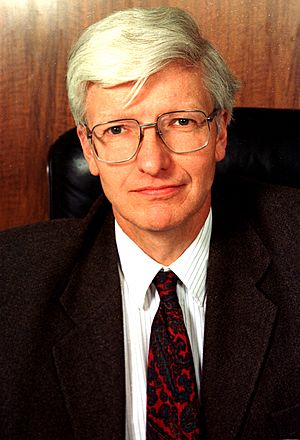Christopher Llewellyn Smith facts for kids
Quick facts for kids
Chris Llewellyn Smith
FRS HonFInstP
|
|
|---|---|

Llewellyn Smith in 1996
|
|
| Provost of University College, London |
|
| In office 1999–2002 |
|
| Preceded by | Derek Roberts |
| Succeeded by | Derek Roberts |
| Personal details | |
| Born |
Christopher Hubert Llewellyn Smith
19 November 1942 |
| Children | 2 |
| Alma mater | University of Oxford (BA, DPhil) |
| Profession | Physicist |
| Awards | Richard Glazebrook Medal and Prize Royal Medal |
| Scientific career | |
| Institutions | CERN University of Oxford University College London SLAC National Accelerator Laboratory Lebedev Physical Institute |
| Thesis | Some problems in elementary particle physics (1967) |
| Doctoral advisor | Richard Dalitz |
| Doctoral students | John Wheater Ash Carter Ian Hinchliffe Nikolas Mavromatos |
Sir Christopher Hubert Llewellyn Smith, born on November 19, 1942, is a very respected professor of physics. He is now an Emeritus Professor at the University of Oxford, which means he has retired but still keeps his title and connection to the university.
Contents
His School Days and Studies
Sir Christopher went to the University of Oxford for his studies. He earned his first degree there. In 1967, he finished his advanced degree, called a Doctor of Philosophy (DPhil). His DPhil was in theoretical physics, which is a branch of physics that uses math to understand how the universe works. He completed this at New College, Oxford.
His Amazing Career in Science
After finishing his DPhil, Sir Christopher worked in several important places around the world. He spent time at the Lebedev Physical Institute in Moscow, Russia. He also worked at CERN, which is a huge science lab in Europe. Then, he went to the SLAC National Accelerator Laboratory in the United States.
In 1974, he returned to Oxford. He became a Fellow of the Royal Society in 1984. This is a very high honor for scientists in the United Kingdom.
Leading Physics Departments
From 1987 to 1992, Sir Christopher was the Chairman of Physics at Oxford. During this time, he helped combine five different physics departments into one big Physics Department. This made the department stronger and more organized.
Leading CERN
From 1994 to 1998, Sir Christopher was the Director General of CERN. This is a very important job, as CERN is home to the Large Hadron Collider. It is one of the world's largest and most advanced scientific research centers. Scientists at CERN study the smallest particles in the universe.
Leading University College London
After his time at CERN, he became the Provost and President of University College London. He held this position from 1999 to 2002.
Awards and Special Recognitions
Sir Christopher has received many awards for his work in physics.
- In 1979, he was given the James Clerk Maxwell Medal and Prize.
- In 1999, he received the Glazebrook Medal and Prize from the Institute of Physics.
- He was made a knight in 2001. This means he can use the title "Sir" before his name.
- In 2004, he became the Chairman of a special committee for fusion energy.
- Until 2009, he was the Director of UKAEA Culham Division. This division is in charge of the United Kingdom's fusion program. It also operates the Joint European Torus (JET), which is an important experiment for fusion energy.
- He is also a member of the Advisory Council for the Campaign for Science and Engineering.
- In 2013, he joined the National Institute of Science Education and Research (NISER) in India as a Distinguished Professor.
- In 2015, he was awarded the Royal Medal by the Royal Society.
His Family Life
Sir Christopher Llewellyn Smith got married in 1966. He has two children, one son and one daughter.
 | Toni Morrison |
 | Barack Obama |
 | Martin Luther King Jr. |
 | Ralph Bunche |

